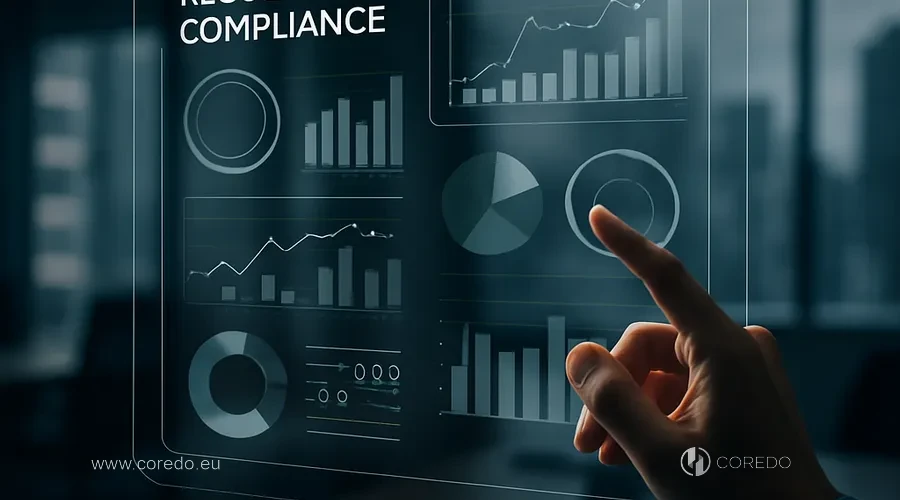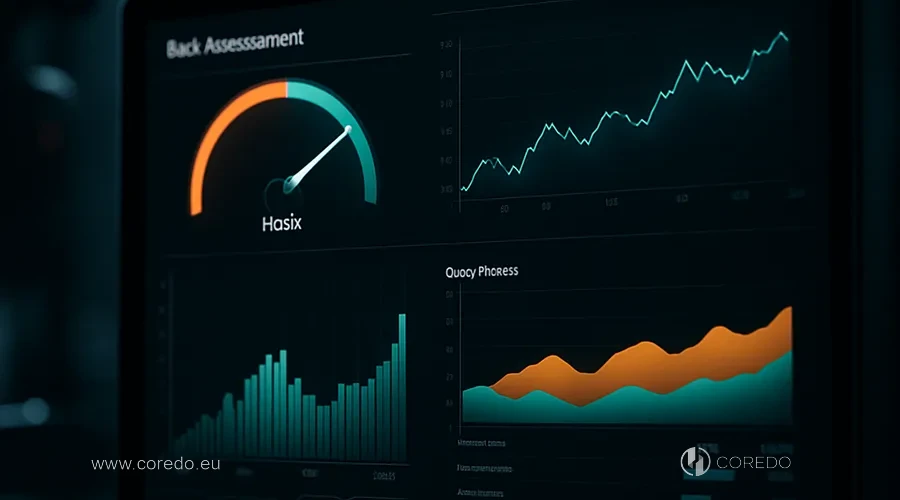In this article I will explain how the COREDO team helps businesses not only meet regulators’ requirements, but also extract maximum benefit from implementing RegTech: reducing costs, speeding up processes, minimizing risks and building trust with clients and partners. If you are looking for practical solutions for company registration, obtaining financial licenses, automating compliance and risk management, I recommend reading to the end. Here you will find not only strategic ideas but also proven practices that already work for our clients in the EU, Asia and the CIS.
What is RegTech and why does a business need it?

RegTech is not just a technological trend, but a business response to continuously increasing and changing regulatory requirements. Modern companies need to understand what exactly RegTech does and why they need it: these solutions help automate control, reduce costs and improve the manageability of business processes amid rising regulatory demands.
Below we will examine in detail the key components of RegTech systems to understand how they work in practice and what tasks they solve.
Key components of RegTech systems
At the core of RegTech are compliance technologies, corporate compliance management tools and solutions for regulatory adherence. The key components of modern RegTech systems include:
- Integration of KYC procedures and customer identity management (Identity and Access Management, IAM)
- Automation of AML processes and transaction monitoring
- Corporate compliance management and process standardization
- Data analytics for fraud detection and risk management
COREDO’s practice confirms: implementing RegTech not only ensures legal compliance but also increases transparency, simplifies company registration and speeds up counterparty checks.
History and drivers of RegTech development
The emergence of RegTech is linked to the tightening of regulatory requirements after the 2008 financial crisis. Massive fines for failure to comply with AML and KYC, increased demands for transparency and combating financial fraud forced companies to look for new approaches to compliance. The key drivers were:
- Growing volume and complexity of regulatory requirements (GDPR, MiFID II, PSD2)
- The need to automate compliance and reduce the human factor
- Increasing complexity of AML services and KYC procedures for international companies
- The emergence of new FinTech and RegTech startups offering innovative solutions
The COREDO team has implemented compliance automation projects for financial organizations in the Czech Republic, Estonia and Singapore, where AML requirements and KYC are particularly high. Our experience shows: only the integration of modern RegTech tools makes it possible to effectively manage risks and comply with international standards.
RegTech for reducing costs and improving compliance
Implementing RegTech allows companies not only to minimize the costs of regulatory compliance but also to increase ROI from compliance. Automation of regulatory reporting, real-time transaction monitoring and standardization of compliance processes reduce operational expenses by up to 50%.
RegTech technologies: modern solutions and innovations

RegTech technologies today are transforming the approach to regulatory compliance thanks to advanced solutions and innovations that automate routine processes and increase business transparency. In this area, special attention is paid to modern technological tools — from artificial intelligence to machine learning — which enable effective analysis and management of large datasets.
Artificial intelligence and machine learning in RegTech
Modern compliance technologies are built on artificial intelligence (AI) and machine learning (ML). These tools analyze large volumes of data, detect suspicious transactions, predict risks and automatically update rules in accordance with changes in legislation.
Machine learning in regulatory technologies not only speeds up AML and KYC processes, but also improves control quality, reduces the number of false positives and uncovers complex fraud schemes that are inaccessible to manual analysis.
The adoption of data analytics for fraud detection has become the standard for banks and fintech companies in Europe and Asia. In one of COREDO’s cases for a payment platform in the United Kingdom, we integrated an AI module that reduced transaction processing time by 40% and enabled the detection of new types of fraud.
Cloud platforms for regulatory support of companies
Cloud solutions for compliance provide scalability, accessibility and a high level of data protection. The use of cloud computing allows companiesquickly implement new RegTech tools, integrate them with corporate systems (ERP, CRM) and provide continuous real-time transaction monitoring.
COREDO’s experience has shown that moving to cloud RegTech solutions allows clients not only to reduce infrastructure costs but also to ensure compliance with cybersecurity and personal data protection requirements.
Thus, cloud technologies are becoming the foundation for integrating innovative compliance tools and further developing digital solutions.
Big data and blockchain for transparency and security
Big Data and blockchain in RegTech open up new opportunities for transaction monitoring, preventing financial fraud, and increasing transparency of business processes. Analytics based on big data makes it possible to detect anomalies, build customer behavioral profiles, and automate decision-making in real time.
Blockchain technologies provide a decentralized and immutable transaction ledger, which is critically important for audits and client identification. In COREDO projects supporting financial institutions in Estonia and Cyprus, we implemented blockchain modules to automate audit and KYC, which helped increase trust from regulators and partners.
RegTech in international business: AML, KYC, company registration

RegTech in international business today becomes the foundation for automating key processes such as AML (anti-money laundering), KYC (customer identification) and company registration. Using regulatory technologies allows companies to respond faster to changing legal requirements, minimize risks and effectively scale operations in global markets.
Automation of AML and KYC with RegTech
Modern AML services and KYC procedures require not only deep knowledge of legislation but also high data processing speed. RegTech allows automating the collection, verification and analysis of client data, reducing human factor and minimizing the risk of errors.
Anti-money laundering technologies and identity and access management (IAM) integrate with corporate systems, providing end-to-end control and transparency at all stages of client interaction.
Company registration and support with RegTech
Registration of legal entities in the EU, Asia and Africa is becoming increasingly complex due to rising requirements for transparency and beneficiary identification. Using RegTech allows automating document preparation, integrating legal aspects of registration with ERP and CRM systems, and providing full regulatory support for companies at all stages.
COREDO solutions were successfully applied in company registrations in the Czech Republic, Slovakia and Dubai, where compliance automation enabled clients to go through complex licensing procedures and open bank accounts without delays and additional checks.
International regulatory requirements: GDPR, MiFID II, PSD2
Complying with GDPR, MiFID II, PSD2 requires not only technical but also organizational changes. RegTech tools provide change management in legislation, standardization of compliance processes and automation of regulatory reporting preparation.
Risk management and security in RegTech

Effective risk management and security in RegTech become key tasks for financial institutions amid increasing digital threats and growing control requirements. Modern RegTech solutions use data analysis and automation to timely identify risks and prevent fraud, providing reliable protection of business processes.
How RegTech detects and prevents fraud
AML services based on data analytics and financial fraud prevention technologies make it possible to detect suspicious transactions in real time and prevent fraud attempts before they are carried out. Transaction monitoring, compliance automation and corporate compliance management become key tools to protect business from financial losses and reputational risks.
Security and confidentiality of client data
Client data management and confidentiality: critically important aspects for international companies. Cybersecurity in RegTech is ensured through the use of modern encryption methods, multi-factor authentication and automation of regulatory reporting.
COREDO solutions include tools to protect against data leaks and ensure compliance with international security standards.
Implementation and scaling of RegTech solutions

The implementation and scaling of RegTech solutions are becoming a key factor for organizations seeking to quickly and efficiently adapt to constantly changing regulatory requirements. Today RegTech is actively being adopted in various regions of the world, helping businesses automate compliance processes and minimize the risks associated with non-compliance.
RegTech implementation in Europe, Asia and Africa – best practices
Implementing RegTech in financial organizations requires a comprehensive approach: from business process analysis to integration with corporate systems and staff training. Scaling RegTech solutions for large companies is possible only with a clear strategy, process standardization and partnerships with experienced law firms.
The COREDO team has implemented projects for company registration in Asia and Africa, where the key success factor was close cooperation between RegTech providers, legal consultants and clients’ internal teams.
Effectiveness and ROI of RegTech implementation
Assessing the ROI of regulatory technology deployment includes analyzing reductions in operating costs, increased process speed and fewer fines. Metrics and KPIs for evaluating RegTech include transaction processing time, fraud detection rate, number of successfully completed KYC procedures and cost-effectiveness of regulatory compliance.
Integration and scaling challenges for RegTech
The main difficulties of RegTech implementation in international companies are related to integration with ERP and CRM systems, the need to adapt to different jurisdictions and managing changes in legislation. Scalability of RegTech solutions requires a flexible architecture, support for local standards and continuous functionality updates.
COREDO’s experience shows: successful scaling is possible only with a clear change management strategy and close collaboration among all participants in the process.
RegTech: trends and development prospects
RegTech: trends and development prospects: a key topic for the financial sector against the backdrop of strengthening regulatory requirements and the rapid growth of technological solutions. Today innovations in RegTech determine not only the effectiveness of law compliance, but also form companies’ competitive advantages, transforming approaches to risk management and operational processes.
Below we will consider how modern trends, including artificial intelligence and machine learning, influence the development of RegTech and open new prospects for the industry.
Impact of AI and machine learning on RegTech
Generative AI and machine learning in regulatory technologies are becoming the basis for automating compliance, risk forecasting and adapting to new threats. In the next 3–5 years, an increase in the adoption of AI solutions for big data analysis, automation of KYC and AML, as well as the development of self-tuning monitoring systems, is expected.
Development of cloud and blockchain technologies in RegTech
Cloud solutions for compliance and blockchain in RegTech provide not only data security and solution scalability, but also transparency of business processes. The adoption of decentralized platforms and automated auditing is becoming the standard for large international companies.
Expanding RegTech beyond the financial sector
Regulatory technologies in the banking sector have already proven their effectiveness, but today RegTech is actively being implemented in insurance, logistics, healthcare and corporate governance. Managing customer identification through RegTech is becoming an important tool for any business that works with large volumes of data and requires a high degree of trust.
Key conclusions and recommendations for business
- RegTech is a strategic tool for international business, allowing automation of compliance, cost reduction and increased operational transparency.
- Comprehensive regulatory support for companies at all stages: from legal entity registration to obtaining financial licenses, is possible only through the integration of modern RegTech solutions.
- AML services and KYC procedures should be automated to speed up processes and minimize risks.
- For successful RegTech implementation it is important to choose solutions that support cloud technologies, AI and integration with corporate systems.
- Effectiveness assessment should be based on clear metrics: processing speed, fraud detection rate, cost reduction and compliance with regulators’ requirements.
- The key to success: partnering with reliable RegTech providers and legal consultants experienced in international jurisdictions.
RegTech implementation: practical steps
- Conduct an audit of current compliance processes and risks.
- Define key automation requirements (AML, KYC, Company registration).
- Choose cloud and AI solutions with scalability and integration capabilities.
- Implement standardized processes and train staff.
- Regularly analyze effectiveness and update solutions in accordance with legislative changes.
Comparison table of RegTech technologies
| Technology | Main functions | Advantages | Business applications |
|---|---|---|---|
| Artificial intelligence | Data analysis, risk detection | High accuracy, error reduction | AML, KYC, transaction monitoring |
| Machine learning | Learning from data, forecasting | Adaptability, model improvement | Risk management, compliance |
| Cloud solutions | Data storage and processing | Scalability, availability | Regulatory reporting, security |
| Blockchain | Decentralized transaction ledger | Transparency, tamper protection | Audit, customer identification |
In conclusion, I would like to note: COREDO’s experience shows that competent RegTech implementation is not just about meeting requirements, but a path to sustainable growth, risk reduction and building trust in international markets.